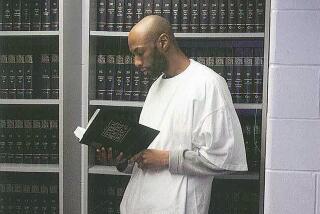Hicks’ plea deal strikes some experts as a sham
- Share via
GUANTANAMO BAY, CUBA — The first war-crimes trial here drew outrage Saturday from legal experts who described it as a perversion of the rule of law that may fatally discredit the Pentagon’s already disparaged handling of terrorism suspects.
Australian detainee David Hicks, whom prosecutors cast as a highly trained and dangerous Al Qaeda operative, will be out of prison before the year ends because of a secret deal cut by the Bush administration appointee overseeing the military commissions.
The jury went through the motions: The panel of senior military officers flew in from around the world, deliberated for two hours and sentenced Hicks -- who had entered a guilty plea -- to what they’d been told was the maximum term of seven years.
But the person overseeing the tribunals, veteran Defense Department lawyer Susan J. Crawford, had bypassed the prosecution and cut a pretrial deal directly with the defense to suspend all but nine months of any sentence rendered in exchange for the guilty plea.
Australian Prime Minister John Howard is one of Washington’s closest allies in the war on terrorism, and his Liberal Party had been flagging in this election year because of public resentment of Hicks’ being held without charges at Guantanamo for more than five years.
Bringing his case to the war-crimes tribunal first, and before all the procedural guidance was ready, left the impression with many legal analysts that Crawford stepped in to do Howard a favor -- at the expense of the commissions’ credibility.
Even the chief prosecutor, Air Force Col. Morris Davis, issued what seemed a subtle dig at the plea deal made behind his back. After offering sincere congratulations to Hicks’ military defense lawyer, Marine Maj. Michael Mori, he said he also wanted to thank Howard’s government for everything it had done to bring closure to the case.
Davis said that the lenient sentence was negotiated without his input and that he signed off on the pretrial agreement because opposing it would have been “a symbolic move.”
The Hicks deal followed by only a day Defense Secretary Robert M. Gates’ expression of concern before a congressional committee that because of Guantanamo’s reputation in the world, the tribunal verdicts were going to lack credibility.
Friday’s “machinations” in the Hicks trial and international reaction to the hand-slap sentence “suggest the accuracy of Gates’ Thursday testimony about global perceptions of the military trials held at Guantanamo,” said University of Richmond law professor Carl Tobias.
Legal analysts condemned the first completed case as fresh evidence that the detention and prosecution are unjust and immoral.
“From the beginning, the Hicks proceedings have illustrated everything that’s wrong with these military commissions,” said Maureen Byrnes, executive director of Human Rights First.
“The plea deal in particular has the taint of coerced statements and secrecy. The deal effectively censors anything Mr. Hicks might allege about what he says he suffered and implausibly characterizes the last five years of his detention as justified under the laws of war.”
As a condition for the light sentence, Hicks was compelled to state that he has never been “illegally treated” in U.S. custody. He also had to promise not to bring any legal actions against U.S. officials or citizens for any reason.
“Add in the widespread perception that the plea deal was in part the result of intense political and diplomatic pressures, and the conclusion is inescapable that these military commissions don’t deal justice, they deny it,” Byrnes said.
The prohibition against Hicks ever claiming he was “illegally treated” in U.S. custody contradicted sworn statements submitted in his attempt to obtain British citizenship and a more protective home government.
The statement to a British court said he had been repeatedly beaten, sodomized and forced into painful positions during interrogations.
Melbourne lawyer Robert Richter wrote in a commentary for Sunday’s The Age newspaper of Melbourne that the Hicks trial was a sham that has wholly discredited the Pentagon’s war-crimes process.
“The charade that took place at Guantanamo Bay would have done Stalin’s show trials proud,” Richter said. “First there was indefinite detention without charge. Then there was the torture, however the Bush lawyers, including his attorney general, might choose to describe it. Then there was the extorted confession of guilt.”
Other legal analysts saw the nine-month term as suspiciously accommodating of Australia’s election season as the deal keeps Hicks out of the public arena until just after the vote expected by December.
“It might just be a coincidence, but if it is, it’s an amazing one,” said Lex Lasry, who came to Guantanamo to observe the tribunal on behalf of the Law Council of Australia, the country’s bar association.
The charge sheet detailing Hicks’ alleged support for terrorist groups initially portrayed him as an accomplice of Al Qaeda kingpins. The prosecutor in his case, Marine Lt. Col. Kevin Chenail, continued through closing arguments Friday to cast the defendant as a danger to Western societies.
“Today in this courtroom we are on the front line of the war on terrorism, face to face with the enemy,” Chenail said. He evoked Al Qaeda attacks against the U.S. destroyer Cole in Yemen and U.S. Embassy bombings in Kenya and Tanzania as examples of how Hicks’ terrorist training could be called into service at any time.
If Hicks was such a menace to Western security, as the U.S. government has alleged since his arrest in December 2001, asked staff attorney Ben Wizner of the American Civil Liberties Union, “why was he given a sentence more appropriate for a drunk-driving offense?”
More to Read
Sign up for Essential California
The most important California stories and recommendations in your inbox every morning.
You may occasionally receive promotional content from the Los Angeles Times.














